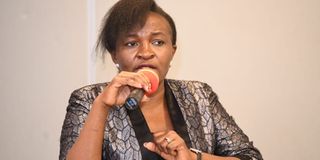What Kenyan midwives want

Angela Nguku, founder and executive director, White Ribbon Alliance Kenya (WRA Kenya).
What you need to know:
- Midwives are not prioritised for personal protective equipment (PPE) and are omitted from vaccine priority lists in countries where they are not considered formal health professionals.
- Yet, midwives cannot cease work, just as women’s sexual and reproductive health needs do not cease during pandemics.
Midwives in Kenya are operating under a myriad of challenges, and would like their voices heard and demands met, a new report by the White Ribbon Alliance Kenya (WRA Kenya) reveals.
“Despite their life-affirming role in providing healthcare for women, midwives are the least paid healthcare workers,” said Angela Nguku, founder and executive director, WRA Kenya, during the launch of the report on what midwives want on September 22 in Kisumu.
The list of demands from midwives includes fair recruitment, promotion and retention practices backed by responsive policies.
The report titled What Women Want: Midwives Voices, Midwives Demands Campaign in Kenya 2021 highlights the challenges of maternal healthcare in Kenya from the perspective of midwives who, according to Ms Nguku, “face persistent and gendered struggles in their economic rights, such as pay inequity, lack of recognition and autonomy in their roles, and a lack of clear career pathway”.
And Ms Nguku should know, having worked as a midwife before founding her organisation, WRA Kenya, in 2009 to ensure that all Kenyan women realise their rights to a safe pregnancy and childbirth.

A midwife carries a poster with a list of demands.
The report, currently in its first phase, covers the lake basin region counties.
Challenges
Some of the challenges highlighted by the report are lack of adequate space, weak referral systems, understaffing and poor pay, with Covid-19 exacerbating the problem.
“Midwives are not prioritised for personal protective equipment (PPE) and are omitted from vaccine priority lists in countries where they are not considered formal health professionals. Yet, midwives cannot cease work, just as women’s sexual and reproductive health needs do not cease during pandemics,” said Ms Nguku at the launch in Kisumu, which midwives and other key stakeholders attended.
"Space and infrastructure are wanting in most of our facilities. For example, my labour ward is almost a quarter of this room. Therefore, you imagine if there are two mothers in labour and two colleagues; you keep brushing on each other therefore impacting on service delivery and also on infringe on the privacy of the client ," said a midwife, as quoted in the report.
Recommendations
Some of the recommendations from the midwives were: strengthening the health system to address issues related to service delivery, the health workforce, the health information systems, health financing and leadership and governance of the health sector.





